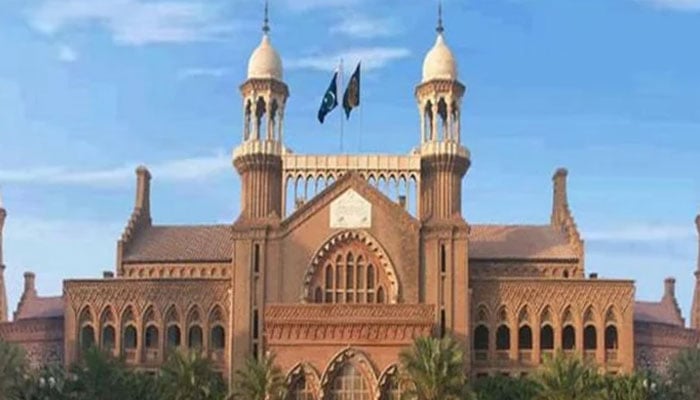Controversial Punjab defamation law challenged in LHC
The petition stated that the defamation law is against the constitution and law and urged the LHC to annul it.
LAHORE: The controversial Punjab Defamation Law, 2024, Saturday was challenged in the Lahore High Court after acting Governor Malik Muhammad Ahmad Khan signed the bill.
Earlier today, sources told Geo News that the bill received a final nod from the acting governor in the absence of Punjab Governor Sardar Salim Khan, who is currently on leave.
The petitions challenging the law have been filed by journalist Jaffar Ahmad Yar and a citizen Raja Riaz. In the pleas filed by the two individuals, Chief Minister Maryam Nawaz, the governor, and the provincial government have been nominated.
The petition stated that the defamation law is against the constitution and law. It added that a new law cannot be made in the presence of the Defamation Act.
The plea lamented that journalists were not consulted before the passing and approval of the defamation law.
"Defamation law was hastily introduced to control the media," the petition maintained, requesting the court to invalidate the "draconian" law.
The Punjab Assembly, on May 20, passed the Punjab Defamation Bill, 2024 amid a strong and noisy protest by the opposition as well as immense backlash from journalists and rights bodies including those based internationally.
'Law to create a chilling effect'
Farieha Aziz — co-founder of Bolo Bhi, an organisation focused on advocacy, policy, and research on digital rights and civic responsibility — insisted that the “law must be challenged”.
Speaking to Geo.tv, Aziz maintained that the fact this bill has received the assent of the governor shows consultations were for optics. She added that the government does not care for input or to legislate in a democratic and transparent manner.
“The Defamation Bill which now goes on to become an Act, has been introduced to privilege the ruling elite and control all dissent through hefty fines by introducing a claimant-friendly law without recourse for defendants as it should exist in accordance with the principles of natural justice,” said the Bolo Bhi co-founder.
Aziz, a vocal proponent of free speech, added that this will create a chilling effect and there will be selective casualties.
Journalists feel 'deceived' by PPP
Reacting to the development, Lahore Press Club President Arshad Ansari slammed the Pakistan Peoples Party's (PPP) deceptive attitude, saying that the party deceived journalists.
"The bill was signed by the acting governor by sending the Punjab governor on leave under a plan," said Ansari.
The senior journalist added that the PPP was apparently with the journalists and was conniving with the provincial government from within.
"A meeting of the action committee will be called soon and future strategy will be announced," said the journalist.
Earlier, Governor Khan — a PPP stalwart — had promised that all stakeholders would be taken into consultation before signing this bill.
However, in his absence, Malik Muhammad Ahmad took over and signed the bill turning it into a law.
Speaking during the Geo News programme 'Capital Talk' last month, the Punjab governor had urged the provincial government to review the defamation bill passed by the legislature.
He maintained that there is a need to review the defamation bill of the Punjab Assembly, as it was not the final word and that the provincial government should review it again and remove the objectionable clauses.
PPP Punjab Parliamentary leader Syed Ali Haider Gilani has complained about the party's legislators not being consulted on the issue and said that the party has rejected the bill as an act which curbs media freedom.
Reiterating that the Bilawal Bhutto-Zardari-led party will never be a part of media sanctions, Gilani reassured that the PPP stands firm in support of the freedom of the media.
The Human Rights Commission of Pakistan (HRCP) has also expressed grave concern over the defamation bill.
"Subject to the provisions of this Act and any other law for the time being in force, defamation shall be a civil wrong and the person defamed may initiate an action under this Act without proof of actual damage or loss and, where defamation is proved, general damages shall be presumed to have been suffered by the person defamed," read the bill.
The bill will also apply to fake news spread through YouTube and social media platforms. Under the law, tribunals will be set up to hear the defamation cases. The tribunals will be bound to decide the case within six months.
-
Security forces gun down 30 terrorists in multiple IBOs in KP: ISPR
-
MQM-P calls for new province in Sindh
-
US report validates Pakistan military edge over India: PM
-
Banned TTP poses serious threat to Pakistan security: UNSC panel
-
CM Afridi clarifies remarks on by-poll after ECP requests army deployment
-
Dubai sees 3.2m Pakistani passengers in 2025 as airport sets new milestone
-
Security forces kill 23 Indian proxy terrorists in KP's Kurram
-
Pakistan to construct island to boost oil exploration: report












